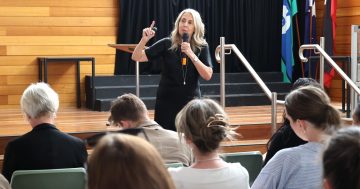
ACT and NSW Catholic teachers went on strike on 30 June. Alex* says teachers are expected to meet expectations they haven’t been trained for. Photo: Claire Fenwicke.
Alex* has always been good with kids.
It was that passion for working with young people which first propelled him into the vocation of teaching.
But after a “challenging” six months on the job in a public school in Canberra, he’s called it quits.
First, he’s had to manage students with severe behavioural issues and those with difficult home lives who needed extra support and care at school. Then, there have been late nights and weekends spent planning and preparing with his colleagues or completing mandatory professional development after hours.
But it’s also proved challenging to work in a job where you “just don’t get a break”.
“Sometimes, we don’t even get the chance to go to the toilet during the day. I don’t think there are any other jobs where you literally can’t go to the toilet because something could happen in your absence if you leave your class unattended and you just don’t have time at lunch and recess,” Alex says.
“I guess it’s fair to say I wasn’t aware of how much extra work teachers have to do – even though I’d studied teaching and also worked in the classroom as a learning support assistant.”
A common sentiment shared by many teachers is that they are no longer just teachers.
“We’re often working with students who have high needs. Sometimes, they have challenges in their personal lives. They have suffered neglect or abuse and so live with different family members,” Alex notes.
“That means that as the classroom teacher, you’re expected to work not only as the teacher but as the psychologist or counsellor – even as a nutritionist sometimes.”
Ultimately, the emotional toll and the stress have proven too much for Alex.
“After a couple of sessions with a psychologist over a period of about four weeks, I came to this decision,” he explains.
While he will take some time out and work in another sector, Alex still hasn’t ruled out the possibility of returning to work with kids or in the classroom at some point.
But right now, he’s burnt out and needs time to recover.
Compounding the issue of workload is, of course, the fact the ACT is in the midst of a teacher shortage which the education union has warned will only get worse in the coming years as there are not enough teachers coming through the pipeline.
Furthermore, the ACT’s Auditor-General found resignations accounted for the majority of teacher separations between 2014 and 2020 and the majority of these teachers who left did so within the first seven years of service.
That audit also concluded the ACT Education Directorate would be unable to maintain teaching quality if enough staff cannot be recruited to cover this turnover alongside predicted student growth.
Instances like Alex’s are rare but they do happen. Directorate officials confirmed that less than 10 teachers left education after one year of teaching.
And as for what can be done about some of the challenges, Alex says he doesn’t even know where to start.
“It’s everything. Even down to the curriculum. I think there’s too much pressure and emphasis on following that despite how much time in the classroom kids have missed out in the last two years,” he says.
“We’re still trying to push something that used to work and doesn’t work anymore.”
*Name has been changed to protect Alex’s identity.





















